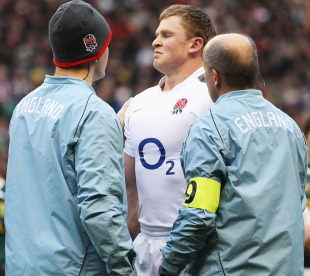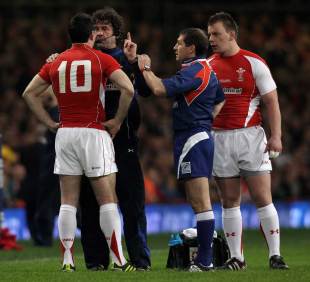|
Aviva Premiership
RFU medics tackle concussion head on
Graham Jenkins
August 20, 2012

England's Chris Ashton recovers his senses following a collision with South Africa's Victor Matfield during their clash at Twickenham in 2010
© Getty Images
Enlarge
It is November 27, 2010 and Twickenham is crackling with the kind of intensity reserved exclusively for a visit of the side widely regarded as the most physically intimidating on the Test match stage - South Africa. The game is only a few minutes old but has already taken a toll on England winger Chris Ashton.
Pitchside Suspected Concussion Assessment (PSCA)
Dazed and confused, he is trying to shrug off a blow to his head and show no sign of weakness after a brutal collision with Springboks lock Victor Matfield temporarily knocked him out cold. Referee George Clancy's concern for the player's mental state is clear, while England's medics desperately attempt to assess his injury amid the cacophony of noise on and off the field. He has clearly been concussed and should be withdrawn but there is little time and space for an adequate diagnosis - with the player's warrior-like desire to return to the fray clouding the issue further. It is just one of many such instances that play out on a weekly basis throughout the elite game, seemingly as common as kick-offs, with each one flirting with what has been labelled as "an undesirable risk". It is one that is unlikely to repeated as of this season, with the sport's leading medical minds determined to tackle the issue head on in a bid to underline their commitment to player welfare. Statistics reveal that over 60% of concussions that occur in the Aviva Premiership are not identified at the time and the pressure and constraints of the modern game have, until this point, not allowed for an adequate and early assessment of such injuries. Such alarming insights prompted urgent action from stakeholders across the globe with the result a trial of new Pitch-Side Concussion Assessment (PSCA) Protocols, which were recently adopted by The Rugby Championship and are now set for the Premiership with further trials in the Top 14, Currie Cup and ITM Cup in the pipeline. "What we know at the moment, because we count concussion as part of our on-going injury study, is that less than 40% of players that are shown subsequently to have suffered concussion come off the field at the time of their concussion," explained Dr Simon Kemp, the Rugby Football Union's (RFU) head of sports medicine and a key figure in the International Rugby Board's (IRB) efforts to address the problem. "So we are leaving 60% of that group on the field with a brain that may not be fully recovered and therefore potentially exposing them to further impacts, which we think is an undesirable risk." An IRB working group set about finding a solution, under guidance from a sport-wide consensus group, which will now see a player suspected of having concussion allowed to leave the pitch for five minutes to be assessed - with a temporary replacement taking the field as in the case of a blood bin. The five-minute window and off-field assessment will address immediate concerns, with Kemp confident that the 'tool' will not be manipulated for tactical gain. "The IRB working group wanted to balance enough time to do the assessment properly with limiting any potential for possible tactical manipulation," Kemp said. "The feeling is that five minutes is enough time to do a clinical assessment and not long enough for there to be any advantage in resting a player for five minutes because there is not enough time to get the replacement up to match speed. In addition the fabric of the game is retained with 15 players on each side." The assessment is not new, but draws together a number of different elements that have been used in concussion assessment for several years. It looks for possible symptoms and signs including headache, nausea, unsteadiness, being dazed or dinged and also incorporates what are known as the Maddocks questions - Who scored last? Where are we playing? - devised to test the player's short-term memory, along with a 20 second balance test. These will all be done in the privacy of a treatment room with one symptom or sign, one 'Maddocks error' or more than four 'balance errors' deemed a failure at which point the substitution becomes permanent. The fear is that the option to withdraw a player may be misused as a tactical ploy as with the 'Bloodgate' incident that rocked the sport in 2009. But Kemp is convinced that a repeat is highly unlikely. "I think everyone has learned a lesson from Bloodgate," he said. "The stakes for the doctor and physio if they are found to be colluding with any possible manipulation are high. The General Medical Council and the Health Professionals' Council would deem any collusion in deliberately breaking the rules of the sport something that constituted serious professional misconduct. "I also think the rugby world understands what the stake. The concussive event will be captured on video, the PSCA assessment cards will go into Bath University for evaluation and what happens to the player subsequently will also be tracked as part of the study." The wording of the protocol suggests referees will have the ability to identify any suspected concussion cases but, aware of the officals' existing workload, Kemp believes the onus will be on each side's medical personnel to step in if required. "We don't want the referees to function as de facto medics," Kemp said. "They exercise common sense throughout the game and can stop it and prompt the team doctor to come on and assess a player with suspected concussion. If the referee prompted you, you would be foolish not to use the PSCA to assess the player."

Wales fly-half Stephen Jones is checked for signs of concussion during the 2011 Six Nations
© Getty Images
Enlarge
Kemp's faith in the game to do what is right extends to players and coaches who, in his experience, are more aware than ever of the issues impacting on their own welfare and are no longer allowing machismo to trump common sense. "I think the reality here is that players are increasingly aware that concussion is a problem to take seriously," he said. "Year on year they have a greater understanding that they are the guardians of their own brain and that they need to look after it. "My sense is that coaches for some time have managed head injuries well, there is an acceptance among them, certainly at elite team level, that you do the right thing, under guidance of your medical team. You want your tight-head to be on the pitch but only if it is safe for them to do so." Broadcasters too are being urged to reinforce the message, with some previously accused of celebrating and making light of the effects of concussion. "If you have got a player that has disturbed balance and is seen staggering in a televised game, it's important that the player comes off and is assessed. The commentator can reinforce a key message by emphasising that abnormal balance is an important indicator of concussion and the medical team did the right thing to bring the player off." The RFU's own injury audit reveals that concussion is the fourth most common injury in the sport, but it is widely accepted that the level of such injuries are under-reported due to confusion over symptoms that can vary from a headache to being temporarily unconscious. Kemp expects the number of cases to rise due to an increase in awareness, but is adamant that English rugby is not sitting on a concussion time bomb that could blow up to the proportions witnessed in the United States, where many ex-American Football players are locked in legal disputes with the National Football League (NFL). "I think there is a fundamental difference between helmeted sports and non-helmeted sports," Kemp said. "The concern in the NFL has come out of the post-mortem study of brains of former NFL players and ice hockey players who have shown signs of chronic traumatic encephalopathy - that has not been identified in any rugby player to date and if you look at retired professional rugby players as a group, they may walk with a limp or have stiff neck but they remain sharp. "Intuitively, if you look around you don't think, on the surface that there is a brewing problem, the sports are quite different. It's likely that if we manage concussion well in the short term it's likely to positively influence the long term consequences. Let's be open and honest, explain the risks to the players, and then put processes in place designed to protect them. Back at Twickenham, Ashton has regained his feet, if not all of his senses, and more importantly he has convinced England's medical staff he is fit to continue. Kemp is reluctant to indicate whether he should have continued and instead underlines his belief that the right call will now be made in such cases. "We would have been very confident that he would have been one of those players who wasn't unconscious by the time the doctor got to him, hadn't had a convulsion or tonic-clonic movement and so would have come off for a PSCA assessment," he said. "I don't want to pre-judge how he would have scored, but he may well have come through the process and been able to return to play safely."
What is concussion?
What might we see?
Typical Symptoms
Physical signs © ESPN Sports Media Ltd. Graham Jenkins is the Senior Editor of ESPNscrum and you can also follow him on Twitter.
|
Live Sports
Communication error please reload the page.
-
Football
-
Cricket
-
Rugby
-
- Days
- Hrs
- Mins
- Secs
F1 - Abu Dhabi GP
Abu Dhabi Grand Prix December 11-131. Max Verstappen ()
2. Valtteri Bottas (Mercedes)
3. Lewis Hamilton (Mercedes)
4. Alexander Albon ()
5. Lando Norris ()
6. Carlos Sainz Jr ()
-
ESPNOtherLive >>
Snooker - China Open
Tennis - Miami Open

